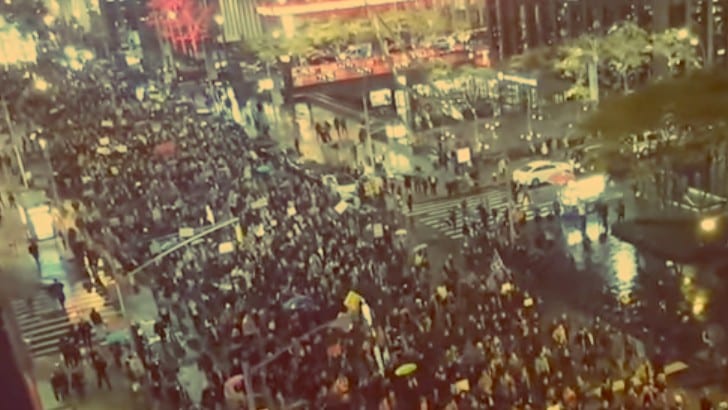
November 27, 2016
BY JASON PRAMAS @JASONPRAMAS
There is little agreement on the broad American left. But the ascension of Donald Trump to the top of the political heap caused a virtual panic from the most conservative corporate Democrats to the hardest core anarchists and communists. Which resulted in a sudden, and probably brief, unity of purpose across the various factions. Then, quickly converting their excess emotional energy into useful activity as is typical in times of crisis, hundreds of thousands of people poured into the streets in the days after the election to protest the very idea that a controversial billionaire businessman and reality TV personality is now president of the United States. Including many Democrats who have never attended a protest in their lives.
This a welcome development. Many important social movements perennially suffer from a lack of grassroots participation. So the sudden entry of huge numbers of infuriated mainstream Dems to oppositional politics is positive on the balance.
If, that is, these new entrants remain willing to take direct action in defense of democracy and fight for a host of necessary reforms—from serious attempts to curb global warming to winning real national healthcare to putting racist police under community control.
As long as the new Republican administration remains somewhere within the bounds of traditional American politics, and doesn’t attempt to crush protest outright, then there is a lot of room for the full panoply of transformative social movements to maneuver.
Assuming Trump is unable to solve the central contradiction of his campaign—making big promises to both fellow CEOs and working Americans alike—there is a strong chance that the Republicans will lose control of one or both Congressional houses in two years, and the presidency in four.
Aside from conservatives gaining as many as three seats on the Supreme Court in that period, much of any damage that Trump may do can then be undone. It’s likely that the Democrats will be back in power by 2021.
The problem being, which Democrats? Will it be a newly-emboldened grassroots-led social democratic party? Or will it be the same neoliberal center-right party that was just resoundingly defeated after failing to heed the populist feedback it was receiving from significant parts of its base?
I hope that the former possibility wins out. At the moment, however, it’s far more probable that the currently discredited Democratic leadership will use its power and connections to simply reassert its authority, raise a ton more money, and work to win back Congressional majorities and the Oval Office without changing its political line a jot.
Which leaves a question for all the angry Democrats currently in the streets for social justice: Are you just fighting to get corrupt and elitist Democratic Party leaders back in command in DC? Or are you all willing to go further and fight for the establishment of genuine left-wing political alternatives in both electoral politics and in daily life?
If the recent past is any guide, many of you will stop fighting for racial justice, women’s liberation, LGBT rights, a living wage, public jobs programs, national healthcare, clean energy infrastructure, etc., the moment the Democrats win back the presidency. You’ll figure “great, everything is back to normal.”
But the politics of most leading Democrats—activist progressives like Elizabeth Warren excepted—is one that results in never-ending war, insufficient action on global warming, expanding corporate globalization, gradual privatization of successful public programs, widening poverty, and continuing the so-called Drug War, the prison-industrial complex, and racist policing.
So real social change will not occur unless grassroots Dems stay in the streets and fight their own leadership for primacy—until we can build a more fair, just, and humane society.
That strategy will necessitate either taking over the Democratic Party and forcing it left, or starting a major new left party. In addition to winning myriad (and quite necessary) issue-specific campaigns.
If all that can be accomplished, America and the planet have a chance. If not? If the Republicans hold power for many years? Or the corporate Democrats come back to power and continue allowing Wall Street to drive national policy?
Then we’re going to be in a very bad place very fast.
Apparent Horizon is syndicated by the Boston Institute for Nonprofit Journalism. Jason Pramas is BINJ’s network director.
Copyright 2016 Jason Pramas. Licensed for use by the Boston Institute for Nonprofit Journalism and media outlets in its network.
Check out the Apparent Horizon Podcast on:
iTunes, Google Play Music, Stitcher, TuneIn, and YouTube

